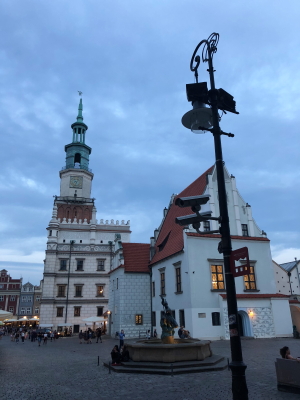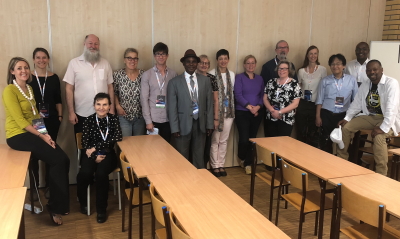13th Human Choice and Computers Conference: This Changes Everything – declared a success at IFIP General Assembly
The conference organisers were warmly congratulated for their part in making a success of HCC13, and its part in the overall success of the World Computer Congress in Poznan, Poland, at the General Assembly of IFIP held in the days following the conference and congress.
Since 1974, the Human Choice and Computers (HCC) conference series has consistently fostered innovative thinking about the interfaces between society and technology. With the awareness, in particular, that Global Leadership on the increasingly pressing issue of climate change is in short supply, Human Choice and Computers turned, this year – among other concerns – to the question: ICT and Climate Change – What Can We Do? Papers on Sustainability, Ethics, Gender, our Digital Lives, Security, Inclusion, and other moments in the history of computing that challenged us, contributed to a rich feast of considerations, discussions, and intellectual stimulus. On the second night of the conference, the documentary of the book by Naomi Klein, This Changes Everything,was shown, highlighting the challenges of climate change, and some of the potential solutions.
Professor Charles Ess, co-chair of the conference, generously provided the text supporting his introduction to the conference, on the morning of Wednesday 19th, and his summary, on the morning of Friday 21st September, and David Kreps, Chair of HCC13, has made a precis of this for IFIP News. (References are to papers in the proceedings of the conference, unless including a date, in which case they are included below.)
After thirty-plus years of efforts to spur dialogue between philosophers, ethicists, humanists, social scientists and computer scientists and software engineers (not to mention Van Herck & Fiscarellion the absence of women in computer conferences), at last, with the “fall of the wall”– software engineers are becoming virtue ethicists (Zevenbergen et al 2015; Spiekermann 2016). Here a completely new urgency, not just for philosophers or ethicists, but for all researchers and in general for all of us emerges: how can we develop a new stage of ethics, an ethics that will drive our behaviour and inform our decisions when the consequences of our acts are so distant in the future (Patrignani & Kavathatzopoulos).

Now, in 2018, “computer ethics have to become a tool to steer computing innovation constructively in a responsible way, and not simply a tool to compensate or fill a policy gap. This is a form of responsible innovation that places human beings, society, sustainability, the environment and planet as essential.” (Patrignani and Whitehouse, cited in Junge and van der Velden) Most pressing, in this regard, is the challenge of A.I. and robotics. Yet “… intelligence, according to shared cognition approaches, can be viewed as a phenomenon taking place in the context of a given ecology and not as an organism’s intrinsic property. No organism can be imagined without a context, and therefore, intelligence is not owned by individuals but happens only within interaction.”(Vassilis Galanos) Thus, AI does not exist in relation to a natural intelligence or in relation to nonintelligent entities. By this double, apparently simple, lesson learned from a re-examination of AI’s characteristics, a number of questions are raised concerning the co-production of morality in meshed human/robotic societies, as well as a tentative agenda for future empirical investigations.
Don Gotterbarn’s Keynote address to conference masterfully framed all this in the move from the presumption of “ethics as rules” to be followed (or not), to Ethics as situated / context-oriented / process oriented within our approach and our daily activities. The launch of the ACM Code of Ethics and its international and cross-organisational promise was an important part of the opening of HCC13.
The question was raised: Do we have time for ethics and other such considerations when the primary concern is the urgency to “save the boat”? For Maja van der Velden, andNorberto Patrignani & Diane Whitehouse and their “Slow Tech”, there is no massive “fix” that can quickly save us: it is by contrast important that we all need to slow downand that, thus, perhaps different / better solutions can be found. Such “epistemological humility” – that we can’t know / control everything – and postures of waiting with hope (vs. drowning in despair), may be paramount in the years ahead.
The relationship between powerand ethics is thus key:we have a greater duty to protect the more vulnerable, and those with more power have greater obligations to exercise power with care and responsibility. Thus, “virtue ethics should be applied to Internet research and engineering – where the technical persons must fulfil the character traits of the ‘virtuous agent’” (Zevenbergen et al 2015).
In the end, as Don Gotterbarn stressed at the outset, framing is everything. Humans can be protected when entangled within a social network / system, and foundational, culturally shaped, assumptions regarding human nature and selfhood(individual vs. relational, etc,) need to be considered and addressed. The priority, in fact, must be upon relationality.Individuals / nodes areonly secondarily connected together in a network (e.g., “networked individualism”). Relational autonomiesare a clearer and more accurate description of our condition. We are both individuals and inextricably interconnected with one another.
At Newgrange, near Dublin, Ireland, there isa 5000year-old chamber “grave”: a four-generation project, designed to mark the winter solstice and the beginning of the return of sun, light, and new life in the spring. While the urgency of the environmental crises cannot be overstated – the planet is burning– at the same time, we may be advised to take the long view as well: recognizing that it will be generations before the environmental / political / economic / social / political / conditions can be reversed / transformed / overcome sufficiently to make the planet habitable and commodious for all of us throughout the ecosphere. This is no reason not to do our best and utmost as quickly as we can. It is a reason to consider that we will likely not be able to do everything necessary within our lifetime. Rather than despair, it is our hope that we can evolve the multi-generational commitments that seem necessary to resolve the crises. If the stone-age clans of Newgrange can do it – perhaps we can find the personal / social / political / economic … resources needed as well for structuring an equally long-term commitment?
References
Spiekermann, Sarah. Ethical IT Innovation: A Value-Based System Design Approach. New York: Taylor and Francis, 2016.
Zevenbergen, B., Mittelstadt, B., Véliz, C., Detweiler, C., Cath, C., Savulescu, J., & Whittaker, M. (2015). Philosophy meets Internet engineering: Ethics in networked systems research. (GTC workshop outcomes paper). Oxford Internet Institute, University of Oxford. Retrieved from
http://ensr.oii.ox.ac.uk/wp-content/uploads/sites/41/2015/09/ENSR-Oxford-Workshop-report.pdf

